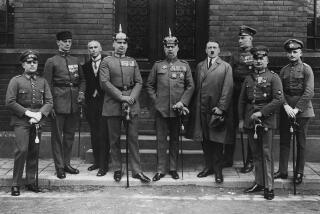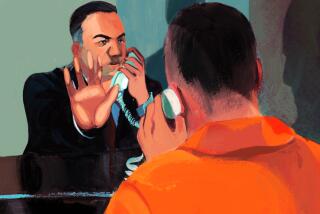I’m No Coup Plotter, Gorbachev Thunders : Russia: Ex-Soviet leader denies complicity in 1991 attempted putsch during treason hearing against a chief conspirator.
- Share via
MOSCOW — “Lies! Arrogant lies! Lies and slander!”
When, at long last, former Soviet President Mikhail S. Gorbachev took the stand Thursday to set the record straight on the 1991 Kremlin coup attempt, his main message--publicly under oath for the first time--was a disgusted denial that he had collaborated with the plotters.
“These are all lies, lies, shameless lies by people who have lost everything,” Gorbachev said of allegations that he initially went along with the coup, that he could have phoned or escaped from his junta-imposed captivity at a government estate in the Crimea.
For all the talk of falsehood, the trial Gorbachev attended is meant to establish the historical truth of the three-day August putsch that horrified the world and, within months, led to the collapse of the Soviet Union.
Formally, military judges at Russia’s Supreme Court are now hearing charges of treason against Gen. Valentin I. Varennikov, one of the most active of the dozen conspirators. But in reality, participants and spectators say, the trial is also meant to determine who is to blame for the Soviet Union’s messy disintegration.
Gorbachev, who remains as scorned at home as he is revered abroad for ending the Cold War, must have had to steel himself for the courthouse ordeal, which began with a gantlet of protesters shouting “Judas!” as he entered.
But the former president, initiator of the Soviet reform program known as perestroika , said he had decided to testify because he wanted to ensure that Russians see the error of trying to solve problems by force instead of legal means.
If the coup attempt appears justified, he said, “We’ll never truly become a country. . . . Everything will be decided by the latest rebels.”
His court appearance has also prompted speculation that the 63-year-old former leader, rosy and energetic as ever, may be planning a political comeback. He told the newspaper Nezavisimaya Gazeta this week that he would not rule out running for president in Russian elections planned for 1996. “If I see that my participation is necessary, I will not avoid it,” he said.
Meanwhile, Gorbachev will be participating in what he termed a very “strange trial,” a clearly political forum in which his role could last two days or two months, considering the volume of information he holds.
The trial was strange to begin with because Varennikov, like the other coup plotters, could have taken advantage of the parliamentary amnesty issued in February covering all Russia’s recent political clashes. Charges were dismissed against all defendants implicated in the 1991 coup attempt and last October’s parliamentary revolt. Only Varennikov refused the favor.
But the amnesty remains in force, and even if Varennikov is convicted of treason, he will go free.
The trial also has something of a time-warp atmosphere. Several of the plotters, including former Soviet Defense Minister Dmitri T. Yazov and former KGB chief Vladimir A. Kryuchkov, attended Thursday, still much the thinner for their months in prison before the amnesty. Protesters outside shouted: “Soviet Union! Soviet Union!”
Nostalgia, in fact, was the very essence of the courtroom drama, with Gorbachev and Varennikov each fighting to pin the blame for the Soviet Empire’s demise on the other--neither allowing that the collapse could have been inevitable, perhaps even for the best.
Gorbachev clearly cannot escape the tormenting thought that he was just on the verge of cementing the Soviet Union together with a new agreement, the Federal Treaty, when the coup ruined the entire long-negotiated deal. “The collapse of the Soviet Union was not unavoidable,” he lamented. “The conclusion of the new treaty was actually a real alternative.”
When it did not focus on one of the most significant political events of the late 20th Century, Gorbachev’s testimony included accounts, detailed to the point of trivia, describing his experiences during the coup.
Letting his throaty voice reflect all his outrage, he accused Varennikov, then commander of Soviet land forces, of intentionally isolating him from the launch mechanism for the Soviet Union’s nuclear weapons, thus endangering the country’s security.
Standing at a pillared lectern that faced the three judges rather than the audience, Gorbachev asserted that he was not after revenge but added, “We’ll never accept the law if we forgive everything.”
Prosecutors and defense lawyers focused largely on trying to determine whether Gorbachev could somehow have indicated his consent to the imposition of emergency rule. Several conspirators have claimed that he initially went along with the putsch plan, then backed out.
Gorbachev allowed that the country was facing difficulties and that emergency rule had been discussed but denied fervently that he had given his approval to the State Committee on the Emergency Situation, as the junta called itself.
Calm and statesmanlike at first, Gorbachev grew noticeably more irritable as the day wore on, particularly after Varennikov accidentally-on-purpose referred to him as “the accused” instead of as a witness. At one point, Gorbachev advised a defense lawyer to read his memoirs for the answer to a question.
“It’s not clear whom they’re accusing; they seem to have forgotten about Varennikov,” Nikolai Zyryanov, a World War II veteran, said in the gallery.
Gorbachev’s testimony was scheduled to continue today, but possibly in closed session.
More to Read
Sign up for Essential California
The most important California stories and recommendations in your inbox every morning.
You may occasionally receive promotional content from the Los Angeles Times.













